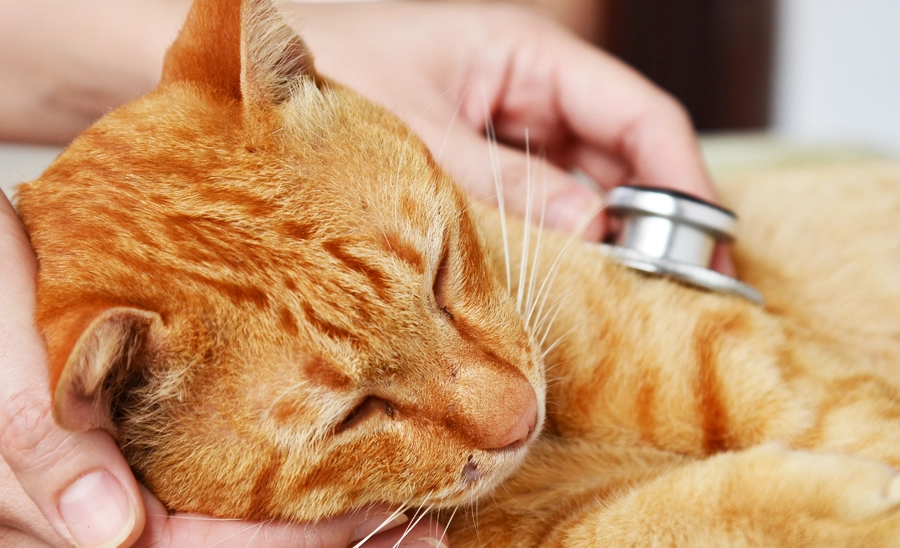
Keeping your furry companion healthy, safe and comfortable in winter.
Should my dog wear a coat? Is it still safe for my cat to venture outdoors? Do my pets need parasite prevention in winter? With the right care and a few seasonal adjustments, you can help your pets stay happy and healthy all winter long.
Book a pre-winter vet check-up
Before diving into winter routines, it’s worth organising a seasonal health check with your veterinarian to help identify any issues that might be worsened by the cold and ensure your pet is in top shape to face the colder months ahead.
Just like humans, animals can also experience a flare-up of certain conditions in cold weather — arthritis, for example, is an inflammatory joint condition that often becomes more painful during winter. Pets with certain diseases, such as diabetes, heart disease or hormonal disorders, may also find it challenging to regulate their body temperature.
It’s a good idea to take your pet to the vet for a pre-winter check-up and advice to support your four-legged friend during the colder months.
“During the winter, pets need to keep warm to prevent potential issues, such as respiratory problems, hypothermia and even depression,” says Veterinarian Dr Russell Barnett from Sydney’s Vineyard Veterinary Hospital. “Colder weather, heaters, food, plants and antifreeze can all pose severe and sometimes life-threatening health problems to our pets.”
Keep your pet warm and safe indoors
If you’re feeling the winter chill, chances are your dog or cat is, too. Look out for your pet trembling or shivering, whining, seeking out warm spaces or heaters, curling up tightly or tucking in their paws and tail, and avoiding cold tiles/flooring.
A dog that is cold may also show changes in behaviour, such as anxiety or reluctance to walk outside. Your cat might seek more cuddles. If your pet becomes severely cold, they may become lethargic and reduced energy levels— a red flag that they need warmth right away.
If you suspect your dog or cat is cold, provide a warm, comfortable bed in a draft-free area, use blankets or heated pet beds to help them stay warm.
But be cautious — household heaters can pose a risk of burns or scalds if touched and may become a fire hazard if knocked over. In fact, Pet Insurance Australia reported a 300% increase in pet burn claims between May and August 2023.
You can help prevent burn-related injuries this winter with some of these tips from Pet Insurance Australia:
• Never leave your pet unsupervised with heating pads on.
• Do not give your pet hot water bottles.
• Do not leave hot drinks in low-lying areas.
• Keep your pet a safe distance away from heat sources. Train them to keep their distance or erect a barrier, such as a fire guard or child guard.
• Keep your pet warm with a good-quality dog coat or blanket instead of using a heating device.
• Discourage cats from jumping on heaters.
• Purchase safe heaters that turn off when knocked over.
• Never leave electric blankets on when you are not at home.
• Think about pet-friendly heat packs and moving bedding into sun-drenched areas.
Snooza's self-warming dog and cat beds are a great electricity-free option to keep pets warm and safe in winter. If you suspect your pet is hypothermic, seek immediate veterinary attention!
Watch out for cold weather hazards
As the temperature drops, there are several outdoor hazards that can pose serious risks to pets – one of the most dangerous being antifreeze poisoning.
“Even the smallest amount can cause kidney failure and prove fatal if ingested, especially cats,” says Dr Barnett. “Signs of poisoning are vomiting, uncoordinated movement, sleepiness, seizures and difficulty breathing.”
In colder weather, shorter walks can help reduce your dog’s exposure to the harsh climate. Consider dressing older dogs, those with thin coats or health issues. Kazoo offers stylish and practical winter warming dog coats, jackets and jumpers to help keep dogs snuggly during the chilly season.
If you walk your dog near frozen lakes or ponds, best to keep them close to you on the lead to avoid injuries from sharp ice or risk of falling into freezing water, which can lead to hypothermia or drowning!
In wintertime, outdoor cats often seek warmth by sheltering under cars or inside wheel arches above the tyres. Before you start the car engine, be sure to check around your vehicle, slam a door or tap on the bonnet to alert any hidden cats! Consider keeping your adventurous feline indoors.
Stay warm and keep active
“Winter weather might not be ideal for long walks or park visits, but regular exercise is still essential for your pet’s physical and mental wellbeing. It helps them stay fit, manage weight and prevent boredom,” says Dr Barnett.
You can keep your dog and cat active at home with scent games and interactive toys. Feather wands, laser pointers or motorised toys are great for stimulating your cat’s hunting instincts, while puzzle feeders can help turn mealtimes into mentally engaging challenges.
You can also build a mini agility course indoors using household items like furniture, chairs, blankets or even cardboard boxes to encourage movement and problem solving. Cat trees – both vertical and horizontal – along with wall shelves provide perfect spaces for climbing and exploration for curious felines.
Try a game of hide-and-seek with your furry detective. Better yet, hide treats in a snuffle mat or around the house for a fun sniffing activity!
Winter nutrition and joint care
Obesity is a serious health issue in pets, and it often starts during the winter months. Reduced activity, increased food consumption and a slower metabolism can all contribute to unwanted weight gain.
“If your four-legged friend is getting less exercise during colder weather, it’s important to adjust their diet,” says Dr Barnett.
For pets that spend time outdoors, a higher-calorie diet may be needed to maintain their body temperature and energy levels during the winter. Indoor pets, on the other hand, may be less active during the colder months and more prone to weight gain from extra treats or comfort eating.
Consider offering treats more sparingly or using their regular meals as rewards during play or training exercises. And don’t forget to provide fresh water daily! Consult your vet about a winter diet that suits your pet’s specific needs.
Your vet may also recommend supplements to support your pet’s joint health, maintain a healthy weight or promote overall wellness during the colder season. For instance, omega-3 fatty acids, glucosamine and chondroitin are commonly used to assist pets with arthritis or when ‘slowing down’ with age.
PAW by Blackmores offers a variety of joint health supplements, including OsteoCare® Joint Protect Chews for Dogs and OsteoSupport® Joint Relief for Cats. ZamiPet Joint Protect may also help reduce your dog’s joint pain, inflammation and stiffness in dogs.
Always consult your vet before introducing any supplements to your pet’s diet.
Don’t skip winter grooming
Even in the colder months, regular grooming is essential to keep your pet’s skin and coat healthy year-round. Indoor heating and reduced humidity can lead to dry, flaky skin, says Dr Barnett, so your dog or cat may benefit from extra grooming and moisturising during winter.
Depending on your dog’s coat type, continue brushing, trimming and cutting as needed. Long coats may look warm but letting your pooch’s fur grow through winter can lead to tangles, knots and discomforting matting!
Cats are generally good at self-grooming, but you still need to brush your feline friend regularly to prevent mats and tangles, especially if they have long fur. Avoid unnecessary baths in winter, as over-washing can strip your cat’s skin of natural oils, leading to dryness and irritation.
For in-between cleans, try Petway Petcare’s Waterless Foam Shampoo for spot- cleaning your dog and Pet Head Felin' Good No Rinse Cat Foam to nourish and deodorise your kitty’s coat between washes.
Need a little extra help? Head to your local Just For Pets independent pet store, where the DIY K9000 Dog Wash makes bath time a breeze – complete with warm water, quality shampoo and a blow dryer to finish the job.
Wherever you wash your pet, make sure the water is at Goldilocks temperature – not too hot and not too cold.
Stay ahead of parasites, rain or shine
You might think parasites are only a summer problem, but ticks, fleas, intestinal and heartworms don’t take a break in the wintertime, warns Dr Barnett.
“Some parasites, like fleas and ticks, may be less active in colder temperatures, but they can still survive and even thrive in indoor environments,” he adds.
Internal parasites such as roundworms, hookworms, tapeworms, and whipworms also pose a risk during winter, often spreading through contaminated environments or fleas.
Heartworm disease is transmitted by mosquitoes, which can unexpectedly become active during unexpected warm spells, even in the middle of winter!
That’s why year-round tick, flea and heartworm prevention is key to keeping your furry friend healthy and your home parasite free. Prevention and treatments include topical solutions and oral medications, such as NexGard Spectra for Dogs and Cats.
Speak to local Just For Pets independent pet store about a comprehensive parasite protection plan tailored to your pet’s needs.
Do pets get the winter blues?
When it’s cold, windy and the sun disappears for days behind grey clouds, it’s hard not to feel a little low and our four-legged friends may feel the same way.
Seasonal affective disorder (SAD), sometimes called the ‘winter blues’, is a type of depression related to a change of seasons. Symptoms typically begin in autumn, continue through winter and ease during the spring and summer months, according to the Mayo clinic.
While the exact cause of SAD is unknown and there’s no known scientific evidence that it affects pets, many owners and vets report behavioural and mood changes in pets during the colder months that resemble symptoms of the winter blues.
These signs can include:
• Sleeping more
• Low energy
• Mood changes
• Change in appetite
• More frequent barking in dogs
• Increase in aggression or destructive behavior, potentially due to boredom because the pet is spending more time indoors
• Excessive shedding
• Decreased interest in toys and exercise
• Hiding or being withdrawn from family
• Clinginess or seeking to always be around the family
Sunlight is necessary for the production of serotonin, the ‘feel good’ hormone, so increasing light exposure can help life your pet’s mood. If the weather permits, take more regular walks or trips to pet-friendly places. Exercising together is a great way to make you both feel better!
Ensure your dog or cat is eating a healthy, balanced diet and avoid too many ‘comfort snacks’. Keep your pet engaged with physical and mental activities, such as ‘find it’ scent games.
Change in behaviour can also indicate an underlying health issue, so it’s a good idea to check in with your vet.
Written by Caroline Zambrano





